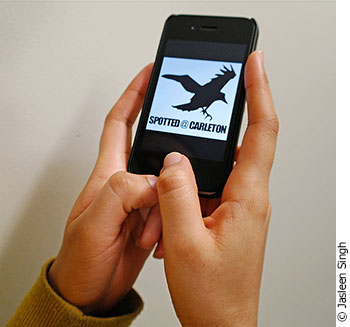Tags
Related Posts
Share This
Looking for love (or ‘Likes’) on ‘Spotted at Carleton’
You’re navigating among dusty bookshelves at Carleton’s MacOdrum Library, when you notice someone: a girl in a blue polka-dotted dress. There’s something about her curly hair that strikes you. As she leaves, you’re left wondering if there’s a way to reach out to her.
The “Spotted at Carleton U” Facebook page could give you a second chance to connect.
The page is a space for Carleton University students to post comments about someone they’ve “spotted” on campus. The forum allows hopeful romantics to reach out to a potential love interest they may not bump into again — or simply to compliment someone they’ve seen, without taking things further.
But there’s a catch: all of the posts are anonymous. So even if your future Juliet spots your romantic note, she’ll have no clue whom it’s from or what you look like. You’ll be able to connect only if the spotted individual responds to your anonymous message.
‘The only trouble is that the connection isn’t real. It’s just a Facebook post.’ – Psychologist Sue Johnson
Visiting the Facebook page allows students to read what Amandeep Gill, a fourth-year sociology student, calls “a Spotted moment.” Romantic posts that seem genuinely heartfelt have hundreds of “Likes”. For instance, a post asking a mystery woman to meet her admirer in a secluded staircase has about 230 Likes, while a more superficial post that refers to someone as “eye candy” has only four Likes.

Check in to see if you’ve been checked out. Carleton student Natasha Gnanam says being “spotted” can give you a much-needed ego boost.
“Spotted” turns the private phase of beginning a relationship into something more fun and interactive, says Natasha Gnanam, a third-year law student. “Sometimes a friend will tell me to visit the page if they see a funny post, and its popularity grows when people talk about it in person.” Although she has never posted a comment on the “Spotted” page, Gnanam visits the forum because she finds the posts amusing: “I just see it as a distraction. And sometimes you see something genuinely romantic that’s worth telling your friends about.”
She adds, “If I saw a description of myself, I probably wouldn’t get in touch with my admirer. But I would at least take a screenshot of it to show my friends — just for laughs.”
Yet not all Spotted-worthy posts are romantic in nature, as student Gill points out: “You’re more likely to get ridiculed for a love-related post, but if you write about trying to reach out to someone who’s done a good deed, the responses are much more positive.”
One kind message thanks a stranger who helped a first-year student find his classes, while another recognizes a person for holding a door open. Other posts ask readers for advice. For example, a student asking if anyone can recommend an easy elective course has about 40 comments that offer suggestions.
Sparrow McGowan, the social media consultant for the Association of Universities and Colleges of Canada, says people are more active on social media if they see other people engaging with it on a regular basis. Popular pages “encourage more people to comment because it’s a place where people aren’t isolated as commentators,” McGowan says. Posts that ask for opinions or seem applicable to a large number of readers quickly become popular because they act as open conversations, she adds.
“Let’s face it, we’re an online community,” Gill says, smiling. “In university, most of us haven’t met each other but we know each other through our online posts and personas.”
The site administrators allow negative or slightly offensive posts if they are witty or will encourage responses. One post reads, “To the people on [the] forth floor… While I am impressed that every night at 1 you are having sex, I would kindly appreciate it if you didn’t do it so loudly.”
‘If I saw a description of myself, I probably wouldn’t get in touch with my admirer. But I would take a screenshot to show my friends.’ — Student Natasha Gnanam
Since its launch in 2012, the page has been immensely popular. The thrill of finding out if you’re the inspiration behind a post has over 10,000 students liking and visiting the page on a weekly, or even daily basis. A group of anonymous students at Carleton created the page and update it daily. With hundreds of posts, and thousands of Likes, it’s hard to keep track of the amount of activity on the page. “I visit the page a couple of time a day, and comment weekly,” Gill says. “It’s addictive because it’s constantly being updated,” she adds.
University campuses are buzzing with life, and many across Canada have started their own “Spotted” pages on Facebook. The University of Ottawa’s page has over 14,900 Likes, while the “Spotted at Ryerson” page is relatively new, with about 5,000 Likes since its launch in March 2013.
There seem to be two main reasons behind the page’s growing popularity: It presents romantic possibilities to starry-eyed students, but more importantly, the page thrives due to its entertainment value. Viewers often revisit the page to see if they were spotted, or to post comments they think will be Liked.
The illusion of connection?

Smartphones fuel the “Spotted” addiction and allow students to send messages the moment they spot a beauty on campus
The idea that your soulmate could be one of the hundreds of people you unknowingly walk by each day is what makes the page an instant hit, says psychologist Sue Johnson, Ph.D., the director of the Ottawa Couple and Family Institute. On a few occasions, friends who know the spotted person reply to the post, offering to play matchmaker and get the potential lovers in touch.
In her new book, Love Sense, Johnson says people are “wired to bond with one another.” University students feel the pressure to find a romantic partner because they need someone to confide in, especially if they’re living away from home, she says. There’s also the desire and need for a physical connection, Johnson explains. she adds, “Men are more tuned to visual cues, which could explain why their posts are often about sexual attraction.”
It’s difficult to tell if all the posts are heterosexual in message. Some comments indicate that the post is from a person of the opposite sex, but the majority of messages don’t provide any indication.
There’s also the question of whether or not people are looking for sexual gratification. “There’s certainly a ‘hook-up’ or ‘friends with benefits’ culture among some students,” Johnson says. “People who visit these sites with the intention of finding casual sex or a one-night stand think of it as freedom, but it’s actually a desperate way of trying to connect. Sleeping with a stranger can even leave you feeling lonelier.” These sites may help you reach out, but visitors are unlikely to find emotional fulfillment, she explains.
“The page allows people to engage in their fantasies of connecting with someone who they find attractive — and they can act on it without the risk of upfront rejection,” Johnson says. “The only trouble is that the connection isn’t real. It’s just a Facebook post.”
Gill says the page “makes Carleton students look like love-sick puppies.” She says Carleton needs a separate dating site because she hasn’t heard of any successful relationships that began on “Spotted.” But Badar Muhi, a second-year accounting student, says “Spotted” played a role in his love life. He says he sent a romantic message to the page’s administrators about a crush he had on a girl in his economics class. Although the couple didn’t get together because of his post, “she thought it was sweet,” Muhi says. “At the time, she didn’t have Facebook and didn’t see it on the page, but it was still nice to publicly state my feelings for her,” he adds.

Getting in shape could get you noticed. Student Badar Muhi says the page can make students feel like celebrities in a campus-sized bubble.
Due to the page’s popularity, the anonymous founders created a “Spotted at Carleton Gym” page in September 2013. “You’re more likely to get in touch with someone if the page is limited to a smaller area like the university gym,” Muhi says.
A love affair with social media
All feelings aside, it seems that trying to spot a mention of yourself on “Spotted” is adding to the page’s popularity. “Secretly, I’ve always wanted to be spotted because I want to know how someone else would see me,” says Muhi. There’s something encouraging about being seen instead of being the one who’s looking and searching, he adds confidently. “I’m not interested in making a romantic connection, but I am curious to see if anyone would notice something about me that’s out of the norm and worth sharing.” Muhi says he visits the page daily and has posted comments that encourage others to write kind and motivating messages, rather than simply romantic ones.
Gill, on the other hand, says she has little interest in posting anonymous messages or being the romantic subject in the posts. Instead, she prefers to comment on the posts. For example, there’s recently been an increasing number of posts that criticize people at the gym for their body shape, Gill says. To respond to the negativity on the “Spotted at Carleton Gym,” she wrote, “All the love is on the neighbouring [‘Spotted’] page, where people are seeking their soulmates.”
Gill says readers need to stop being passive observers and start responding when they see hateful remarks. “The more you comment on a Facebook page, the more others learn about your online personality,” she adds. “That’s because when you send a post to the page’s administrators, you remain anonymous, but when you respond to a post, you name shows up with your comment.”
Some students are merely interested in seeing something they’ve written posted online, where lots of other people will read it, says Rena Bivens, a fellow at Carleton’s School of Journalism. The impulse to revisit the page to see if what you’ve written was Liked or commented on can be addictive to some people, she says. “Over time, Facebook tries to cultivate what a good user is, which is someone who posts a lot,” Bivens adds.
Psychologist Johnson says that the writers of these “selfish posts” are equally as driven, as those who seek to connect, by the need to get attention and form a bond. The urge to display your thoughts indicates your need to reach out to others, she explains: “You don’t know these people, yet you still want to hear from them. So even if you’re not trying to reach out to that special person, you’re trying to write something interesting that you want other readers to respond to.” She adds, “In the end, the page is about the power of longing for human connection.”
Gill explains that “Spotted at Carleton U” will continue to remain popular because students will use the page to talk about their shared university experiences. Even if students aren’t writing about a specific person, she says students will post in order to complain about the winter weather or point out trends in clothing. “Pretty soon, people will be spotting everyone in the library during exam time.”
“It’s just a Facebook page, but it can change the way we observe others,” Muhi says. “Maybe it challenges us to notice the little details about people we let slide by. If you really want to make a connection, you’ll have to go beyond just describing someone. It’s about something more important: It’s about a lasting impression that stays with you.”
Home-page photo © Jasleen Singh.
What’s on 'Spotted at Carleton U'
“I read this page like I read the evening news.”
“To the nice, good looking guy who helped me find my way to my lecture in Mackenzie building on Friday at around 10 a.m. a few weeks ago — we talked for a bit but I was too shy to get your number! Thanks for helping a new Raven find her class…”
“To the lovely girl in Biology that I met on the 87 to Billings (afternoon Nov. 10th). Sorry I was in such as rush to get home after being out for the day. It was cold. I was really enjoying talking to you and would like to continue talking to you… [From] the engineer that wishes he had got your number.”
“To everyone who comes across an attractive person, I dare you to actually approach them and start a conversation, instead of heading straight for Spotted. Someone may be more appreciative that u had the courage to go up to them…”
Source: Spotted at Carleton U Facebook page





